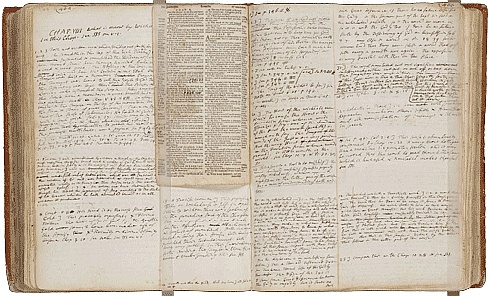 Biographical Introduction
Biographical Introduction
Jonathan Edwards (1703–1758) is infamous for his extreme Calvinist theology in general (according to the Oxford dictionary) and his doctrine of double predestination in particular exemplified by The Freedom of the Will (1754). Edwards famous fire and brimstone sermon Sinners in the Hands of an Angry God (1741) we tremendously influential during the Great Awakening and his hearers shrieked with fear and dread of hell. Jonathan Edwards' 70 New Year's Resolutions (1716) are sometimes is circulated at the end of the year, and occasionally his posthumously published Original Sin (1758) and his book on post-revival apostasy Religious Affections (1754) are periodically referenced, but otherwise Edwards' theological works are relatively unknown to this day. (All 73 volumes of Jonathan Edwards' works are available online at the Jonathan Edwards Center at Yale University, and I will link directly to them throughout this article.)
Edwards' Notorious Family
Jonathan Edwards and his wife Sarah Pierpont (1710-1758) had a influential (notorious) family consisting of a large household with eleven children (and three slaves!) in North Hampton where he was the pastor of the town's Congregational church. Jonathan Edwards was part of an influential family; Edwards was the grandson of Solomon Stoddard (1643 – 1729), an effectual Puritan pope for all the congregational churches in New England in the late Colonial Era and Edwards was the grandfather of Aaron Burr (1756-1836), the third Vice President of the United States. His son Jonathan Edwards Jr became an abolitionist. Sarah Pierpont was the daughter of James Pierpont who founded Yale University too. Jonathan Edwards was a star from a starlight family, but tragically disappear into obscurity like a shooting star after his death. It wasn't until Perry Miller published his works on the Puritans, such as his book Jonathan Edwards (1949), that an Edwardsian renaissance began to take place. In recent years, Jonathan Edwards has become admired and admired by American Evangelical Calvinists such as John Piper, and other famous celebrity pastors.
More than a Calvinist Theologian
Jonathan Edwards is largely admired by Calvinist Independent Baptists today despite being a Puritan congregationalist pastor who affirmed doctrines such as infant baptism and postmillennialism that baptists typically reject. Edwards also frustrates his reformed admirers today by opposing paedocommunion (i.e. infant communion) and embracing panentheism. Edwards was also a scientific theologian, who was fascinated with science his whole life and was quick to affirm the scientific consensus of his day, beginning with his early Spider Letter (1723) and was an avant-guard proponent of vaccinations, which sadly resulted in his untimely death from a small pox vaccination gone awry in 1758 while Edwards was president of Princeton University (named College of New Jersey at that time). Edwards was benefactor of nepotism, but betrayed his white privilege when he protested Solomon Stoddard's Halfway Covenant, which allowed church membership to people without an authentic conversion experience, and this consequently led to Edwards dismissal from his pastorate in 1751. Edwards was fired because he stopped allowing the wealthiest North Hampton families from purchasing the front row seats in his church (a literal position of honor), but the true reason was that he had become politically unpopular for opposing Solomon Stoddard's positions, and especially his Halfway Covenant.
Jonathan Edwards and the Mohican Indians
After Edwards left North Hampton, he became a missionary to the "Mohican Indians". Many of Edwards' sermons to these Native Americans are extent and are interesting to read because Edwards intentionally preaches in a broken-English that he believes the Native American would better understand. Edwards viewed Native American culture as inferior, but he also believed that these Native Americans were inherently human (like himself) and suffered from the same original sin. (c.f. Edwards' book with the same title) as the entire human race. Despite Edwards statements of inherent human equality, his sermons such as "In The Name Of The Lord Of Hosts" (1755) were strategic propaganda to fortify military alliance in case of war. These Native Americans served Edwards military needs in a similar way that the African slaves he owned served his household.
Edwards devoted many years to evangelizing the Mohican Indians, and was passionate about his work, which is apparent from his "Farewell Sermon To The Indians" (1758). Edwards' passion for missions was fostered by his friend and fellow missionary David Brainerd (1718-1747) who died in Edwards home after his mission to Native Americans as well. Edwards wrote a biography about Brainerd titled The Life of David Brainerd (1749) that is still famous among missiologists.
Recommended books about Jonathan Edwards
So you still want to read Jonathan Edwards? To begin, there are many books about Jonathan Edwards life and theology that I highly recommend. George Marsden has written an excellent biography titled Jonathan Edwards: A Life that I highly recommend to learn more about Edwards life, and Marsden also published an abridged version A Short Life of Jonathan Edwards too. In addition to Perry Miller's book, I also recommend Oliver Crisp's works including Jonathan Edwards: An Introduction to His Thought, Jonathan Edwards on God and Creation, Jonathan Edwards: Philosophical Theologian, etc. Other notable Edwards books include Amy Plantiga Pauw's The Supreme Harmony of All: The Trinitarian Theology of Jonathan Edwards, Don Schweitzer's Jonathan Edwards as Contemporary: Essays In Honor of Sang Hyun Lee, and Elisabeth D. Dodds' Married to a Difficult Man: The Uncommon Union of Jonathan and Sarah Edwards.
A Jonathan Edwards Reading List
I've already listed Jonathan Edwards most popular works throughout the article that have influenced on American Evangelicals (especially American Evangelical Calvinists today). However, Jonathan Edwards most interesting book are less well known, so the following reading list is my recommended path to learning Jonathan Edwards most fascinating ideas.
#1. Jonathan Edwards on the Trinity
Recommendation #1. Jonathan Edwards' "Discourse on the Trinity" (also titled "An Unpublished Essay on the Trinity" or simply "Essay on the Trinity") was written in the early 1730's and is a Narcissistic philosophical argument for the Trinity based in Lockean Idealism. Similar to the Greek myth of Narcissus, Edwards argues that god has an ideal self-understanding, such that god's perfect idea of god is a repetition of god that corresponds to god the Father and god the Son, and consequently god loves god's perfect self idea that is another repetition of god that corresponds to the Holy Spirit. Edwards' "Discourse on the Trinity" is available in Writings on the Trinity, Grace, and Faith (WJE Online Vol. 21), edited by Sang Hyun Lee. I recommend reading this essay in particular, and the entire volume in general for more of Edwards Trinitarian writings.
#2. Jonathan Edwards on Eschatology and Panentheism
Recommendation #2. Jonathan Edwards' dissertation "Concerning the End for which God Created the World" is an example of Edwards' panentheism and postmillennial eschatology, and it is often cited by Edwards scholars as their favorite work. Panentheism is the idea that the world is contained within god (which is different that pantheism that identifies god with the world). Oliver Crisp provided this helpful outline of Edwardsean panentheism in his book Jonathan Edwards on God and Creation.
Jonathan Edwards' dissertation "Concerning the End for which God Created the World" is available in Jonathan Edwards' Ethical Writings (WJE Online Vol. 8) edited by Paul Ramsey. I highly recommend this dissertation, but also recommend reading the entire volume which includes Edwards' dissertation on "The Nature of True Virtue" and a sermon series on 1 Corinthans 13 called "Charity and Its Fruits" that includes Edwards famous sermon "Heaven is a World of Love" (1738).
#3. Jonathan Edwards on the Half-Way Covenant
Recommendation #3. I briefly discussed Jonathan Edwards' criticism of Solomon Stoddard's Half-Way Covenant. Edwards argument is presented in a series of writings that includes Edwards' An Humble Inquiry, Misrepresentations Corrected, and Narratives that are available in Ecclesiastical Writings (WJE Online Vol. 12) edited by David D. Hall. I recommend beginning reading An Humble Inquiry for an introduction to Edwards' argument against the Half-Way Covenant, and then reading Edwards answer to criticism in his follow up work Misrepresentations Corrected, and also reading his personal accounts of the entire controversy last in Narratives. The full titles (in Edwardsean puritanical style) are summaries in themselves:
- "An Humble Inquiry into the Rules of the Word of God, Concerning the Qualifications Requisite to a Complete Standing and Full Communion in the Visible Christian Church" (1749)
- "Misrepresentations Corrected, and Truth Vindicated" (1752)
- "Narrative of Communion Controversies"
#4. Jonathan Edwards' Blank Bible and Miscellanies

Recommendation #4. My final recommendation is The "Blank Bible" (WJE Online Vol. 24) edited Stephen J. Stein. The Blank Bible is basically a commentary by Jonathan Edwards on the entire bible. The online Blank Bible has a scripture index, that is handy for getting brief commentary from Edwards on scriptures. Often the Blank Bible will reference one of Edwards countless Miscellanies which are short writings (usually a sentence to a few paragraphs long) on various topics. (The WJE Online has compiled all of Edwards' Miscellanies into a Miscellanies Index online for easy reference, and they have printed multiple volumes containing his miscellanies).
A Final Warning on Jonathan Edwards

I'll add one brief warning label to the following recommendations. All theologians are sinners, and many great theologians have committed horrific sins and never repented from them, and this includes Jonathan Edwards who was a Slave-Owner. Although Edwards writings on slavery are sparse and incomplete, his biography is not incomplete (see the above biographies for more details on Edwards' involvement in the American slave trade). Consequently, I still love Jonathan Edwards' theology and believe there is much to learn from this great American Calvinist Theologian. However, Jonathan Edwards' defense of slavery includes implicit racism, white supremacy, and authoritarianism that maybe inseparable from his theological works at times. So it is imperative to read Jonathan Edwards critically (like all theologians), and test whether Edwards' scientific, philosophical and theological writings to determine if they preach Jesus Christ or not.
Related: Aaron Burr, An Humble Inquiry, An Humble Inquiry into the Rules of the Word of God, Concerning the End for which God Created the World, David Brainerd, Discourse on the Trinity, freedom of the will, George Marsden, Great Awakening, infant baptism, infant communion, John Locke, Jonathan Edwards, misrepresentations corrected, Mohican Indians, narrative of communion controversy, Oliver Crisp, paedobaptism, paedocommunion, Panentheism, pantheism, postmillennialism, Sarah Pierpont, Sinners in the Hands of an Angry God, Slavery, Slaves, Solomon Stoddard, Spider Letter, The Life of David Brainerd, Timothy Edwards, Unpublished Essay on the Trinity



Leave a comment